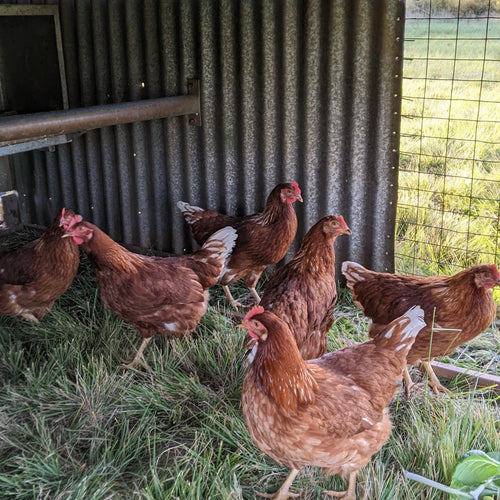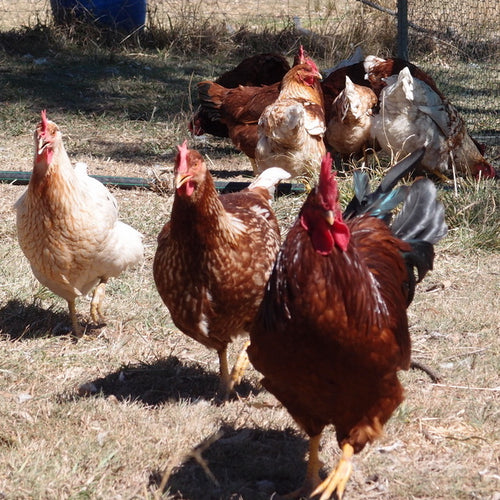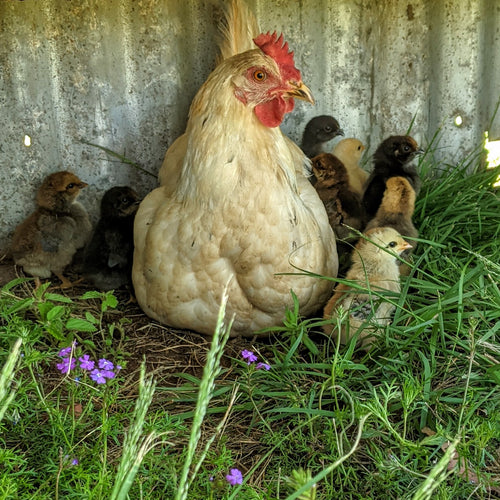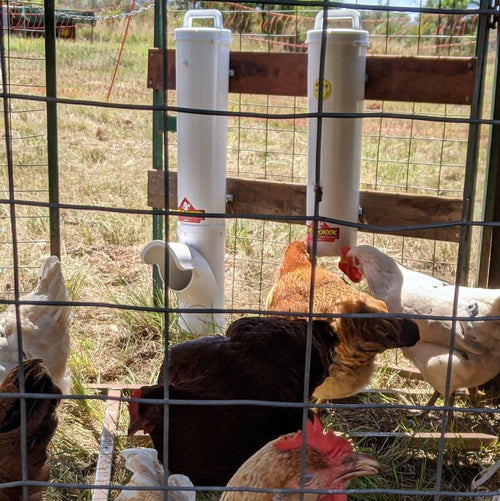How to stop hens from eating eggs
Recently we had a serious case of egg eating with all our hens. We caught them in the act a few times, and they also left tell-tale signs of egg yolk around the nesting box. For a few days we had no eggs from nine hens in two separate cages, so it was time to sort it out.
The theory proposed on this thread is that hens only eat their eggs if the egg shells are weak. Apparently the hens peck the egg after its laid to check the shell. If the shell is too weak for the egg to be viable (ie to hatch a chick) then the shell will break when its pecked and the hen will eat the egg to clean up the mess. I've never seen this happen myself, but some of the posters on that thread claim to have seen it happen. Even if hens aren't clucky, it may just be one of those natural reflexes.
The main solution then was to strengthen the egg shells. We had noticed that the egg shells were a little thin, but hadn't really thought about it. We usually feed cuttlefish bone to the hens (picked up a the beach for free), and this seems to be a good source of calcium. I hadn't given any out for a while because they weren't being eaten, I didn't want to waste them! After reading that forum I put cuttlefish bone in both cages. By the next day all the cuttlefish was gone and I had three eggs. I put more cuttlefish bone out and had five eggs the next day. Now I'm not saying that the theory is proven conclusively, but that's good enough for me to say you should try feeding extra calcium (shell grit or dolomite if you don't have cuttlefish) before you cull any hens or muck around with mustard eggs!
Isn't it interesting that this behaviour (probably) comes down to a mineral deficiency.
Have you had a problem with hens eating eggs? Does this help?
Considering how long humans have been keeping chickens, the collective knowledge about egg eating is surprisingly inconclusive. Most of the information that I've read on the net or in books has suggested either culling the chickens or filling an egg with mustard to put them off. The second option was looking better than the first, but still not ideal, then I came across this forum thread, which had some very insightful suggestions.
The theory proposed on this thread is that hens only eat their eggs if the egg shells are weak. Apparently the hens peck the egg after its laid to check the shell. If the shell is too weak for the egg to be viable (ie to hatch a chick) then the shell will break when its pecked and the hen will eat the egg to clean up the mess. I've never seen this happen myself, but some of the posters on that thread claim to have seen it happen. Even if hens aren't clucky, it may just be one of those natural reflexes.
The main solution then was to strengthen the egg shells. We had noticed that the egg shells were a little thin, but hadn't really thought about it. We usually feed cuttlefish bone to the hens (picked up a the beach for free), and this seems to be a good source of calcium. I hadn't given any out for a while because they weren't being eaten, I didn't want to waste them! After reading that forum I put cuttlefish bone in both cages. By the next day all the cuttlefish was gone and I had three eggs. I put more cuttlefish bone out and had five eggs the next day. Now I'm not saying that the theory is proven conclusively, but that's good enough for me to say you should try feeding extra calcium (shell grit or dolomite if you don't have cuttlefish) before you cull any hens or muck around with mustard eggs!
Isn't it interesting that this behaviour (probably) comes down to a mineral deficiency.
Have you had a problem with hens eating eggs? Does this help?
By the way, my chicken eBook is now available if you want to know more about backyard chickens and using chicken tractors. More information over at the chicken tractor ebook blog. Or you can get it directly from my shop on Etsy (.pdf format), or Amazon Kindle or just send me an email eight.acres.liz {at} gmail.com.
or just send me an email eight.acres.liz {at} gmail.com.
What's the eBook about?
Chickens in a confined coop can end up living in an unpleasant dust-bowl, but allowing chickens to free-range can result in chickens getting into gardens and expose them to predators.
A movable cage or “chicken tractor” is the best of both options – the chickens are safe, have access to clean grass, fresh air and bugs. Feed costs are reduced, chickens are happier, and egg production increases.
But how do you build a chicken tractor? What aspects should be considered in designing and using a chicken tractor effectively? In this eBook I aim to explain how to make a chicken tractor work for you in your environment to meet your goals for keeping chickens.
I also list what I have learnt over 10 years of keeping chickens in tractors of various designs and sizes, from hatching chicks, through to butchering roosters.
Reviews of the Design and Use a Chicken Tractor
























Leave a comment